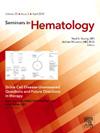Effective sequencing of chimeric antigen receptor T-cell therapy in the treatment of LBCL in 2023
IF 4.1
3区 医学
Q1 HEMATOLOGY
引用次数: 0
Abstract
Over the last decade, CD19-targeting chimeric antigen receptor (CAR) T-cell therapy has profoundly changed the management of relapsed/refractory large-B-cell lymphoma (LBCL). At present, there are three FDA-approved anti-CD19 CAR T-cell products for LBCL: axicabtagene ciloleucel (axi-cel), lisocabtagene maraleucel (liso-cel), and tisagenlecleucel (tisa-cel). Two of these (axi-cel & liso-cel) are approved for use in the second-line setting under certain conditions. As CAR T-cell therapy continues to define a new role in the treatment armamentarium for LBCL, questions remain regarding which product to use and how to sequence CAR T-cell therapy with other therapeutic options. Here we will briefly review the key features of each FDA-approved anti-CD19 CAR T-cell product and the data that led to regulatory approval for each. Next, we will focus on the recent landmark studies that have established the use of CAR T-cell therapy as second-line treatment. While no direct prospective head-to-head comparisons exist of the 3 constructs, we will review some retrospective studies that suggest some emerging differences between the products. Lastly, we will turn our attention to the horizon as we explore some of the ongoing questions of how to best leverage the curative potential of CAR T-cell therapy for the most effective management of LBCL. These areas include the consideration of CAR T-cell therapy in the frontline setting, the optimal timing for CAR T-cell referral, the optimal bridging approach, and how to continue advancing novel CAR T-cell approaches in the context of the current treatment landscape.
2023 年嵌合抗原受体 T 细胞疗法在治疗 LBCL 中的有效排序
在过去十年中,CD19靶向嵌合抗原受体(CAR)T细胞疗法深刻地改变了复发/难治性大B细胞淋巴瘤(LBCL)的治疗方法。目前,美国食品和药物管理局批准了三种治疗 LBCL 的抗 CD19 CAR T 细胞产品:axicabtagene ciloleucel(axi-cel)、lisocabtagene maraleucel(liso-cel)和 tisagenlecleucel(tisa-cel)。其中两种(axi-cel & liso-cel)已获准在特定条件下用于二线治疗。随着CAR T细胞疗法不断在LBCL的治疗手段中扮演新角色,关于使用哪种产品以及如何将CAR T细胞疗法与其他治疗方案进行排序的问题依然存在。在此,我们将简要回顾美国食品及药物管理局批准的每种抗 CD19 CAR T 细胞产品的主要特点,以及导致每种产品获得监管部门批准的数据。接下来,我们将重点介绍近期开展的具有里程碑意义的研究,这些研究确定了 CAR T 细胞疗法作为二线治疗的用途。虽然目前还没有对这三种产品进行直接的前瞻性头对头比较,但我们将回顾一些回顾性研究,这些研究表明这三种产品之间存在一些新的差异。最后,我们将把目光转向地平线,探讨如何更好地利用 CAR T 细胞疗法的治疗潜力,最有效地治疗 LBCL。这些领域包括考虑在一线治疗中使用 CAR T 细胞疗法、CAR T 细胞转诊的最佳时机、最佳桥接方法,以及如何在当前治疗格局下继续推进新型 CAR T 细胞疗法。
本文章由计算机程序翻译,如有差异,请以英文原文为准。
求助全文
约1分钟内获得全文
求助全文
来源期刊

Seminars in hematology
医学-血液学
CiteScore
6.20
自引率
2.80%
发文量
30
审稿时长
35 days
期刊介绍:
Seminars in Hematology aims to present subjects of current importance in clinical hematology, including related areas of oncology, hematopathology, and blood banking. The journal''s unique issue structure allows for a multi-faceted overview of a single topic via a curated selection of review articles, while also offering a variety of articles that present dynamic and front-line material immediately influencing the field. Seminars in Hematology is devoted to making the important and current work accessible, comprehensible, and valuable to the practicing physician, young investigator, clinical practitioners, and internists/paediatricians with strong interests in blood diseases. Seminars in Hematology publishes original research, reviews, short communications and mini- reviews.
 求助内容:
求助内容: 应助结果提醒方式:
应助结果提醒方式:


